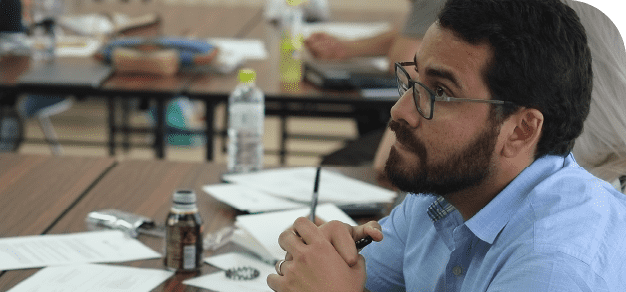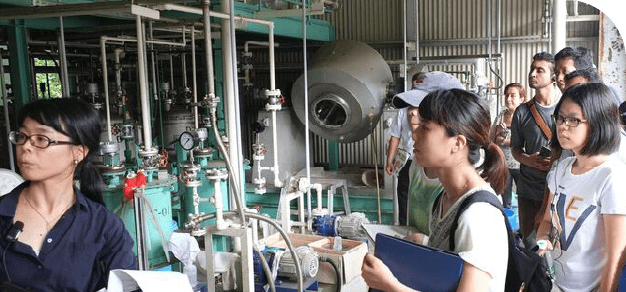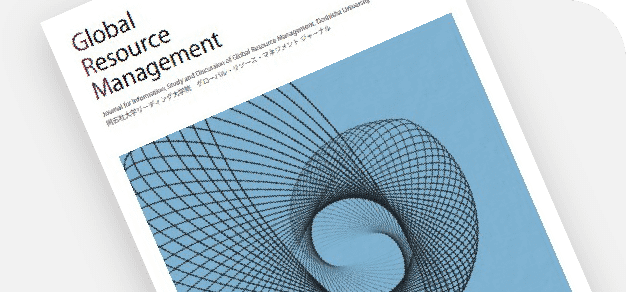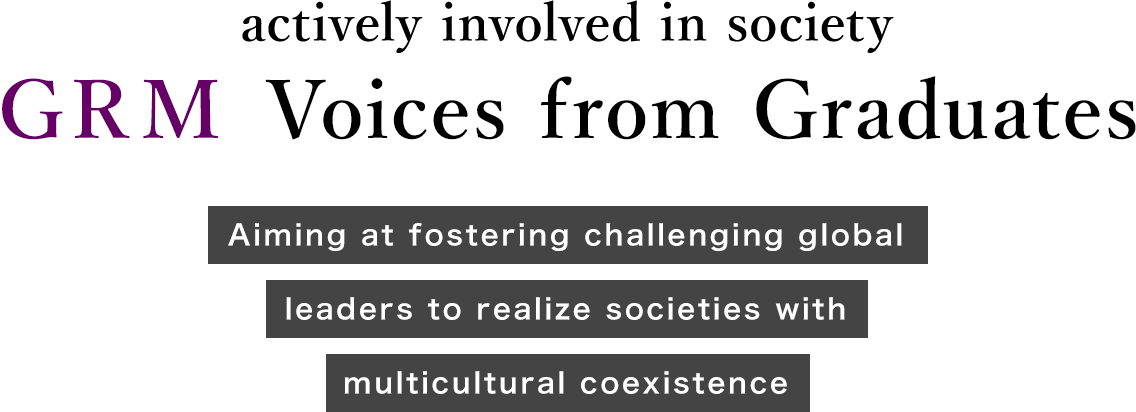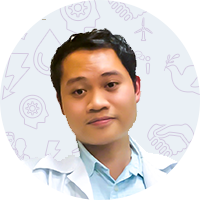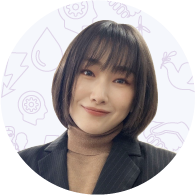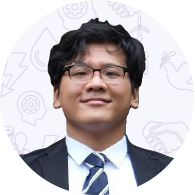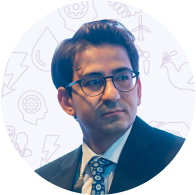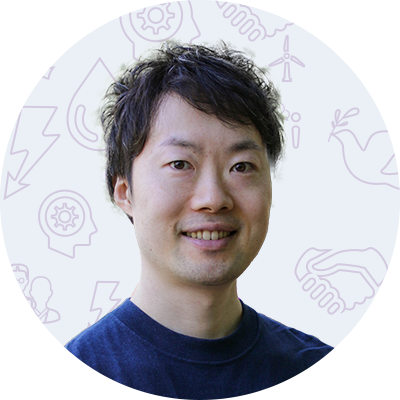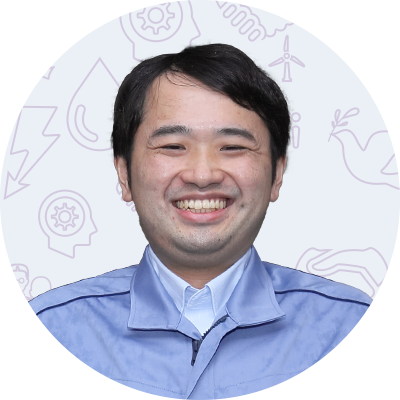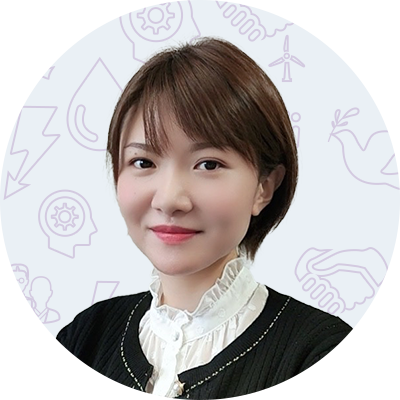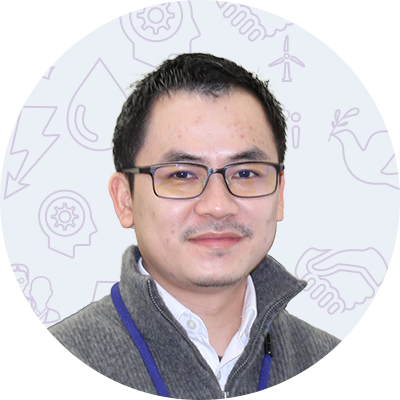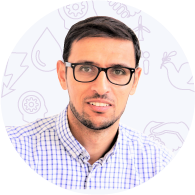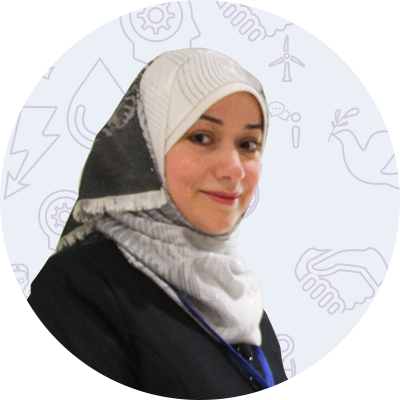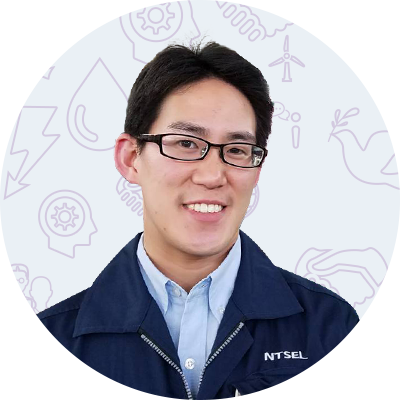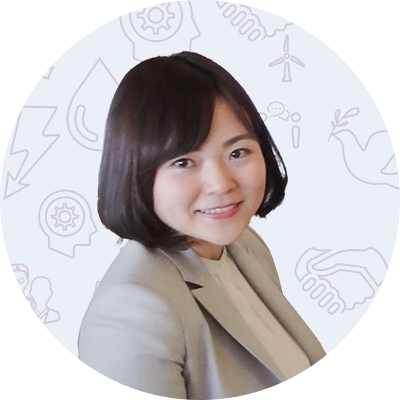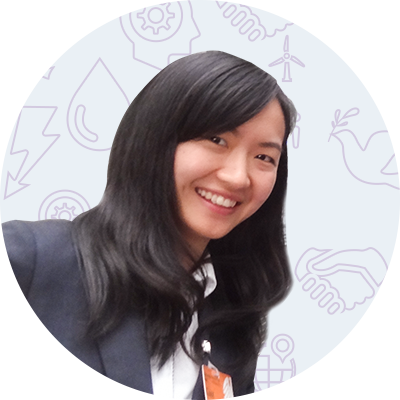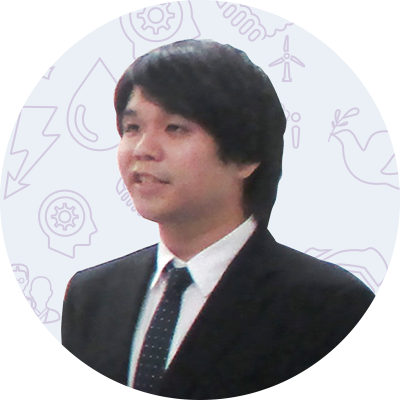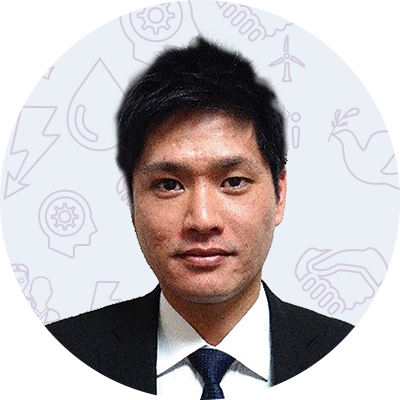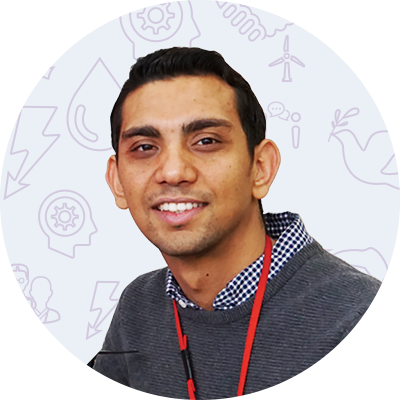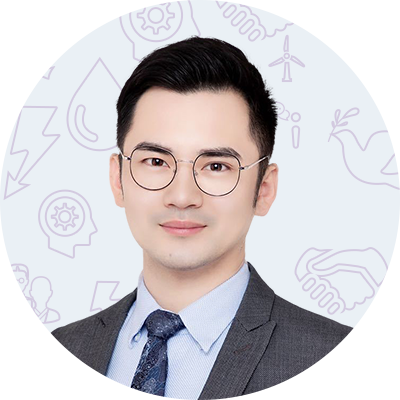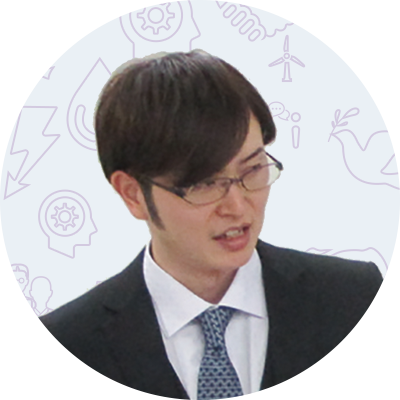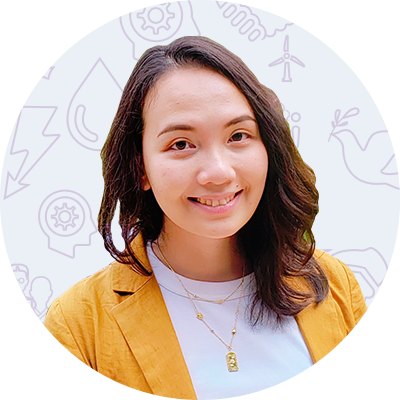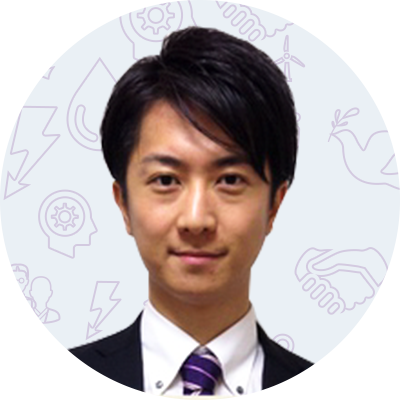2022Graduates
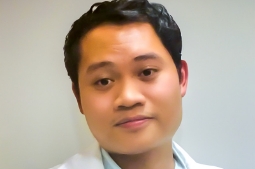
profile
NewJames Edward Hernandez II
Completed in Spring 2022
Affiliation: School of Science and Engineering
Name of employer: Institute of Laser Engineering, Osaka University
Q1.What are the reason(s) you decided to participate in the GRM program?
Ever since I was undergraduate, I had a background of holistic education from my courses. The GRM program was an opportunity for me to further my learning in this similar manner of generalized knowledge. Moreover, I wanted to apply my learnings, as closely as possible, to societal activities. The GRM offered a series of excursions, which significantly improved my experiences and perspectives as a graduate student.
Q2.What was your career goal/path you were thinking when you entered graduate school?
My initial career path was to go into semiconductor field, or something related to optics and photonics. Being a researcher was also one of those which I considered.
Q3.Did you make any efforts which led you to finding a job while you were in your graduate school?
I did attempt the traditional Japanese job-hunting method (hand-writing CV's and taking internships) for a few months but I was not successful in finding a job this way. The process was difficult, and I tried to ask my professors if they knew companies which I could apply. In the end, I fortunately received some offers after graduation.
Q4.What made you decide your current career/job?
From what I have studied in PhD, I have a huge interest in lasers, its technologies, and laser plasmas. I thought that this occupation will be significantly helpful in fostering my career path, as well as my interests. Moreover, the current job is a research position, which I had experience in.
Q5.How did your experience in the GRM program influence your career path?
I think GRM provided me a skill of thinking in a broader perspective. For me, a career should have meaning attached to it, so I had to choose my career options carefully. A broader vision also means keeping in mind that what I do should benefit, in some way, a certain community or a system. I think GRM, while exposing us to the developments and realities of society in general, motivated me to think beyond joining another institution and try to do meaningful work.
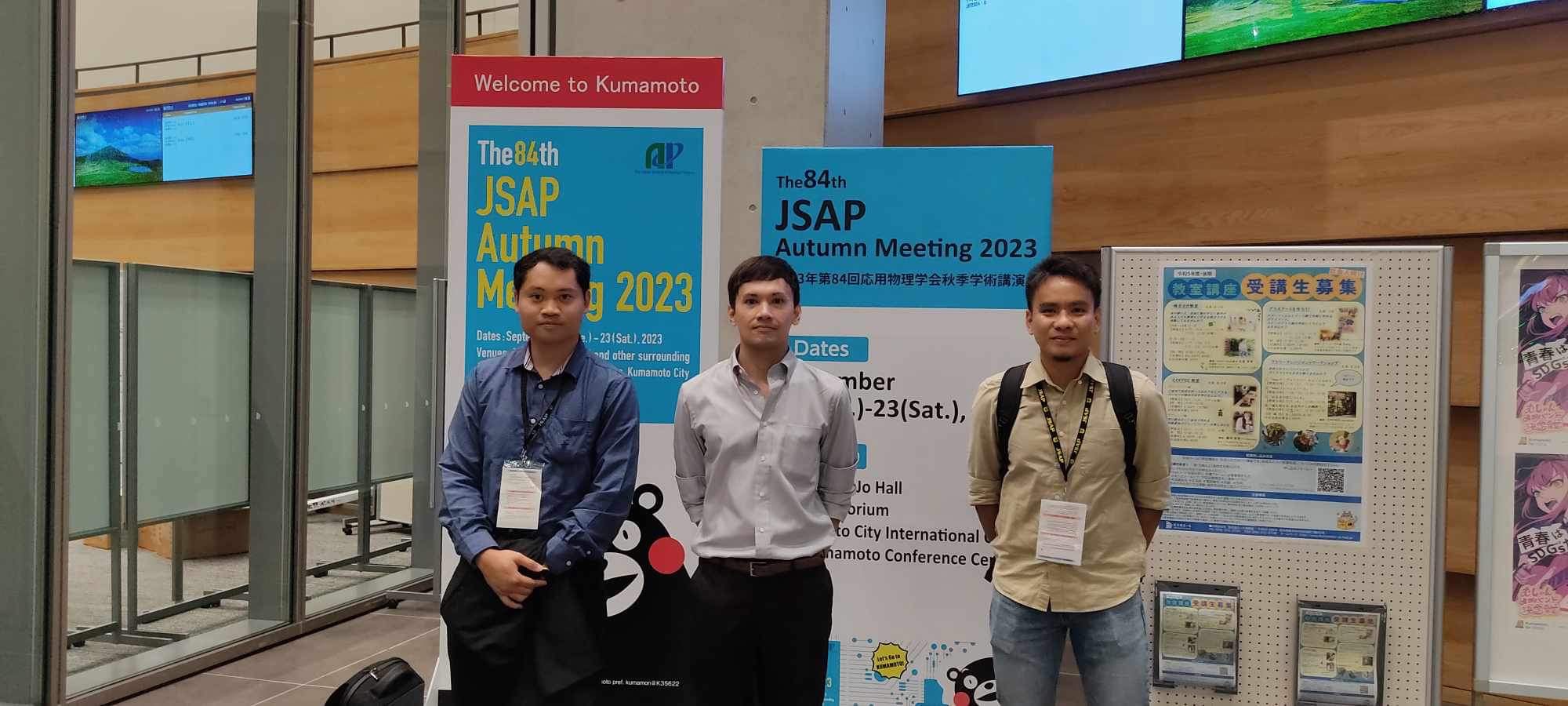
Q6.In what kind of situations did you find it positive and helpful to have learned from GRM program as you work for the current company?
As a researcher, I am currently establishing local and international networks mainly related to my field of study. I think GRM helped me to recognize the importance of collaborations within and even outside of our expertise. The best way to learn something is to discuss with other experts.
Q7.Did you encounter any difficulties in your job hunting as a Ph.D. candidate? If so, please describe it.
As stated in Question 3, I started seriously finding a job after graduation, so I did not encounter difficulties.
Q8.What do you think are the benefits of Ph.D. holders' working for a private company?
I am currently working in a university, but I think PhD holders can contribute creativity in the company when it comes to various developments.
Q9.What is your perspective on the expanding role of a Ph.D. holder in society in the days ahead?
As a PhD holder, I think I have a role in sharing my knowledge, as well as collaborating with institutes as much as I can. As there are relatively few PhD holders in my home country, this serves as a motivation to pioneer my field there while undergoing training here in Japan.
Q10. Please write a message to students who are considering whether or not to take the GRM Program.
I think GRM will be a good opportunity for students to gain a broader view of the world outside their field. GRM offers several courses which may lead to excursions that can make your graduate school experience unique. Students can also discuss with peers outside their home campus, including professors, which is a rare chance.
2021Graduates
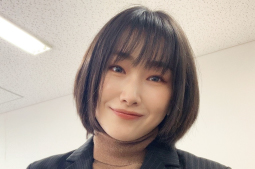
profile
Yang Huimin
Completed in Spring 2021
Affiliation: Graduate School of Social Studies, Social Welfare
Name of employer: Public university
Q1.What are the reason(s) you decided to participate in the GRM program?
I was interested in the concept of “Integration of humanities and science”.
Q2.What was your career goal/path you were thinking when you entered graduate school?
I wanted to teach at university.
Q3.Did you make any efforts which led you to finding a job while you were in your graduate school?
I participated in conference debriefing sessions and conference receptions.
Q4.What made you decide your current career/job?
I thought I was able to continue researching themes of interest to me.
Q5.How did your experience in the GRM program influence your career path?
I was able to broaden my perspectives through on- and off-campus learning and interaction, and at the same time, the experience had a positive impact on my job search.
Q6.In what kind of situations did you find it positive and helpful to have learned from GRM program as you work for the current company?
When I face with difficulties, I became able to consider things from multiple angles.
Q7.Did you encounter any difficulties in your job hunting as a Ph.D. candidate? If so, please describe it.
Nothing in particular.
Q8.What do you think are the benefits of Ph.D. holders' working for a private company?
Nothing in particular, as I was employed by a university.
Q9.What is your perspective on the expanding role of a Ph.D. holder in society in the days ahead?
We expect to be able to develop technologies and provide welfare support based on an understanding of the needs of the community and individuals as well as a whole society.
Q10. Please write a message to students who are considering whether or not to take the GRM Program.
Your hesitation is evidence that you want to participate in the GRM program.
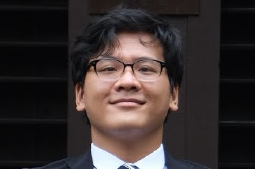
profile
Wenyu Zhang
Completed in Fall 2021
Affiliation: Graduate School of Science and Engineering
Name of employer: Materials Analysis Technology Inc.(MA-tek)
Q1.What are the reason(s) you decided to participate in the GRM program?
I was interested in the goals of GRM program and looking forwards to working with international researchers.
Q2.What was your career goal/path you were thinking when you entered graduate school?
Any jobs that I can utilize my skills that I learned from academic.
Q3.Did you make any efforts which led you to finding a job while you were in your graduate school?
Yes, such as taking Global Career Design course offered by GRM.
Q4.What made you decide your current career/job?
It’s an international company and my work is similar to my academic research.
Q5.How did your experience in the GRM program influence your career path?
I trained my teamwork, communication and leadership skills in GRM, and it proves to be a great help in my career now.
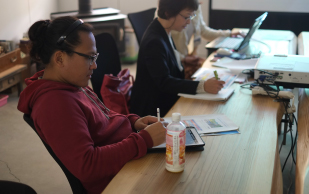
Q6.In what kind of situations did you find it positive and helpful to have learned from GRM program as you work for the current company?
Especially on the effective communication, such as explaining technology to people in a easy-to-understand manner.
Q7.Did you encounter any difficulties in your job hunting as a Ph.D. candidate? If so, please describe it.
Yes, because it really depends on the employer if they want Ph.D. holder.
Q8.What do you think are the benefits of Ph.D. holders' working for a private company?
There are many, to name one: we are open to new knowledge and we know how to learn. So, it’s easier for us to pick up in a new company.
Q9.What is your perspective on the expanding role of a Ph.D. holder in society in the days ahead?
Hopefully Ph.D. holders can be the pillars of our society.
Q10. Please write a message to students who are considering whether or not to take the GRM Program.
You won’t lose anything anyway, why not take it?
2020Graduates
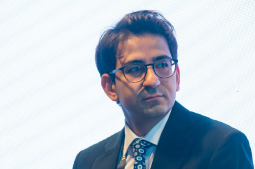
profile
Mostafa Khalili
Completed in Fall 2020
Affiliation: Graduate School of Global Studies
Name of employer: The Hakubi Center for Advance Research, Kyoto University
Q1.What are the reason(s) you decided to participate in the GRM program?
I have a Bachelor's degree in Electrical Engineering and changed my major to humanities from the Master's course. The GRM program was a perfect program for me to combine my background in science with the knowledge I acquired in humanities effectively. That's why I did not hesitate to apply when I learned about the novel interdisciplinary approach employed by the GRM program.
Q2.What was your career goal/path you were thinking when you entered graduate school?
I intended to pursue my path in academia from the beginning. But I was interested to be in an interdisciplinary environment, and the Hakubi center for advanced research is one of the perfect examples of such an atmosphere.
Q3.Did you make any efforts which led you to finding a job while you were in your graduate school?
I started job-hunting in the third year of my Ph.D. course and could get a JSPS Postdoctoral position right after I finished my doctoral course.
Q4.What made you decide your current career/job?
In my job environment, we have bi-weekly seminars where researchers from various disciplines give lectures about the recent developments in their field of study and we actively engage in multi-disciplinary discussions. This is what I have learned from the GRM program and continued in my current job.
Q5.How did your experience in the GRM program influence your career path?
The selection committee of the Hakubi center at Kyoto University highly evaluates candidates with a multi-disciplinary background. The education that I received and the papers that I developed during my GRM fellowship were highly influential in my career path.
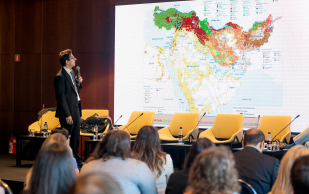
Q6.In what kind of situations did you find it positive and helpful to have learned from GRM program as you work for the current company?
I engaged in several projects concerning Sustainable Development in developing countries and had various field trips to different parts of the world. This has helped me to enhance my task management and communication skills in my current projects.
Q7.Did you encounter any difficulties in your job hunting as a Ph.D. candidate? If so, please describe it.
As I only targeted academic institutions, the competition in the job market was tough! I got rejected probably in over 50 applications, but I kept trying and finally found a good position.
Q8.What do you think are the benefits of Ph.D. holders' working for a private company?
I think the think tanks or R&D sections of the companies are one of the best places for Ph.D. holders to use the best of their knowledge and experience in the workplace.
Q9.What is your perspective on the expanding role of a Ph.D. holder in society in the days ahead?
I believe that the most important value needed to achieve sustainable development on our planet is to enhance critical thinking! Getting Ph.D. is the best training to develop such an ability.
Q10. Please write a message to students who are considering whether or not to take the GRM Program.
If you are looking for a highly engaging and multi-disciplinary research environment, I strongly suggest the GRM program! Even though it is challenging to put additional effort into earning extra credits and classes, what you gain will change your way of thinking for the rest of your life!
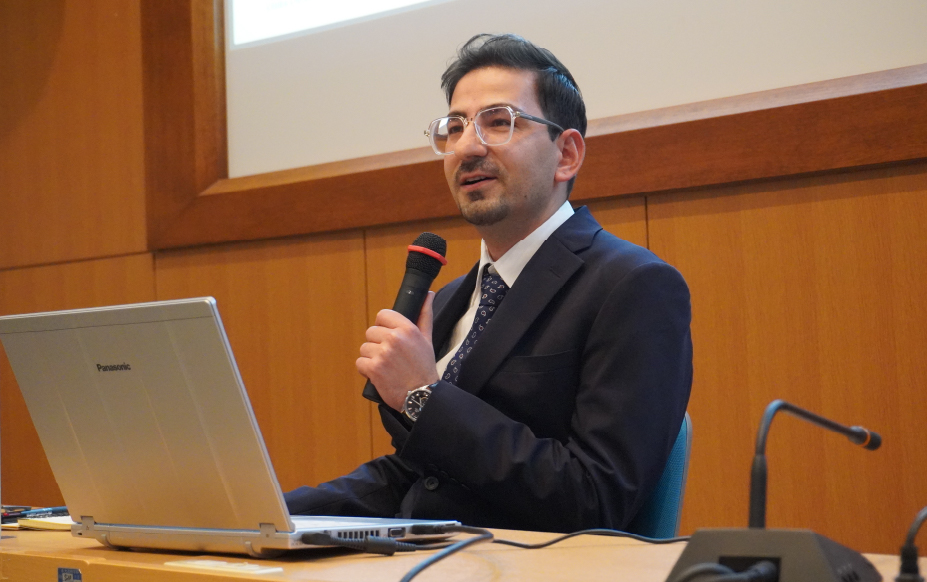
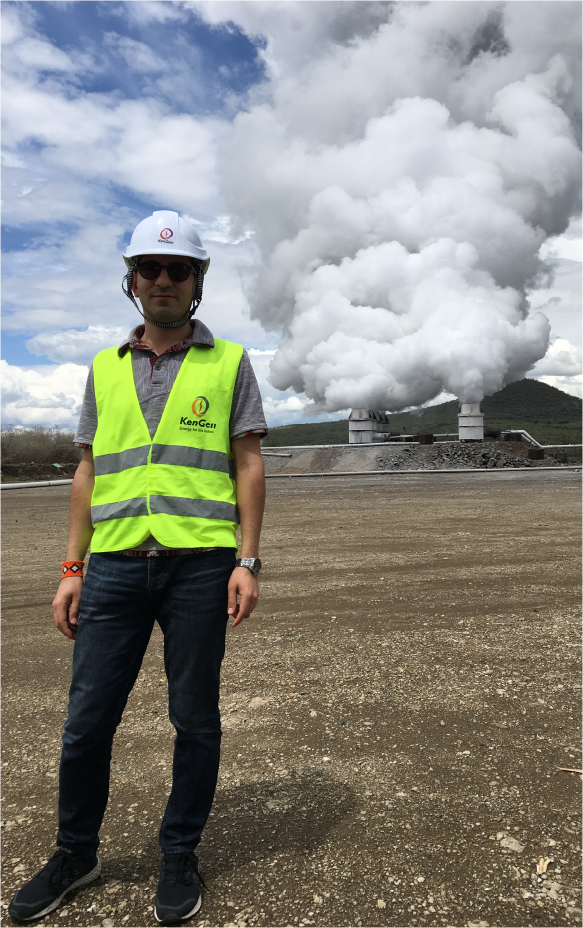
2019Graduates

profile
Moriyama Takuya
Completed in Fall 2019
Affiliation:Graduate School of Global Studies
Name of employer : Kiko Network (Environmental NGO)
Q1.What are the reason(s) you decided to participate in the GRM program?
In addition to the excellent research support such as subsidies for overseas research, I was attracted to the fact insert that the program aims to contribute to the solution of social issues and is committed to “integration of humanities and sciences” beyond the boundaries of existing academic fields.
Q2.What was your career goal/path you were thinking when you entered graduate school?
I wanted to work in a research position at a university or other research institutions, private sector, an NGO/NPO, or any other industry where I could utilize the expertise I gained through my graduate school experience and research. While making use of my research experience in some way, I also wanted to contribute to the solution of social issues in a way that is not limited to researchers in the narrow sense of the word. So I was interested in the GRM program, which has a goal to develop such human resources.
Q3.Did you make any efforts which led to finding a job while you were in your graduate school?
I participated in the anti-nuclear activities by a civic group, and had experience translating, writing articles, and having lectures. I also participated in several other civic movements including filming and video editing, which is useful in my current job. I did some job-hunting and got the first job at a think tank (NPO) aiming for nuclear abolition and disarmament while I was still in graduate school. Although it did not lead directly to a job, I also participated in internships at overseas food sales companies, humanitarian aid NGOs, and overseas offices of Japanese companies through the Internship Program. In addition, I took advantage of my experience in practical courses in electrical engineering to obtain a national certification as a second-class electrician.
Q4.What made you decide your current career/job?
When I was in graduate school, I participated in protests against the restart of nuclear power plants and the security bills, but I felt frustrated that decisions were made against public opinion without reflecting the voices of citizens. In Japan, there are few maybe use “avenues” in place of circuits avenues to reflect citizens' voices in political decision-making, and important decisions are often made only by a few limited stakeholders. In such a situation, I believe that NGOs/NPOs, as a group of experts independent of the government and corporations, have a role to play in leading citizens' participation in politics through policy proposals and information dissemination. There are many difficulties, but I think that is why we are required to be creative and take on challenges by changing our approach in various ways, and it is also interesting to have a variety of experiences.
Q5.How did your experience in the GRM program influence your career path?
In graduate school, I met many people who created their own career paths by demonstrating their individuality and special skills in various research activities, such as in laboratories, conference presentations, and fieldwork in research target areas. These people inspire me and remind me that there is no single correct career path.

Q6.In what kind of situations did you find it positive and helpful to have learned from GRM program as you work for the current company?
The issues related to nuclear weapons, AI/robotic weapons, military use of space, and new missiles that I worked on at my first company, and the issues related to the climate crisis and energy policy that I am currently working on at my current company, are all fields that require expertise that transcends the boundaries of the humanities and sciences. Some of my supervisors and colleagues had backgrounds in engineering, marine physics, and other sciences. Through the GRM program, I have acquired the attitude to face issues from a perspective beyond the boundaries of the humanities and sciences and academic disciplines, and to learn new fields of specialization when necessary. As a result, I feel that I am able to face the social issues that need to be solved, rather than being confined to the scope of my own specialty.
Q7.Did you encounter any difficulties in your job hunting as a Ph.D. candidate?
If so, please describe it.
When it comes to finding a job in the private sector for a doctoral degree holder in the humanities, I feel that it is very difficult to find a job through the same job-insert hyphen hunting process as an undergraduate student. There are few companies that expect applications from doctoral degree holders, and they do not understand what graduate schools are like or what graduate students do. Also, if you are over a certain age, you lose your eligibility to apply for new graduate employment, and if you have no work experience before entering graduate school, you cannot apply for mid-career employment either. In other words, there is a risk of falling into a situation where one cannot even apply for either new graduate or mid-career employment. In order to improve the current situation, it is necessary that research experience in doctoral programs be properly evaluated and recognized as work experience. I would like to see a change in awareness on the part of companies, but students also need to devise ways to appeal their research experience.
In the NGO/NPO industry, people are expected to be able to work immediately, and most recruitment is done on a mid-career basis. However, depending on the relationship between your work and your research theme, your graduate school experience may be positively evaluated.
Q8.What do you think are the benefits of Ph.D. holders' working for a private company?
I believe that the advantage for a doctoral degree holder is that he or she does not confine himself or herself to the specialization that led to the doctoral degree, but can open up greater possibilities and expand the field of activity.
In addition to specialized knowledge and experience, research activities cultivate the ability to identify and solve problems on one's own, and the insert self-management skills to plan and execute. These basic skills are also very useful in the workplace outside the university.
Q9.What is your perspective on the expanding role of a Ph.D. holder in society in the days ahead?
As companies seek to secure a diverse workforce regardless of gender, age, nationality, or background in order to cope with the unpredictable times and technological innovation, I believe that there is a possibility that doctoral degree holders will be able to play an active role in the future. Doctoral degree holders can expand their fields of activity by developing career plans and taking on new challenges with a flexible attitude unconstrained by any insert precedent.

Q10. Please write a message to students who are considering whether or not to take the GRM Program.
Entering a doctoral program itself is a decision that requires a great deal of determination, but the experience of pursuing your interests and questions and gaining expertise will be an advantage that you can use in a variety of situations afterwards. If you think the GRM program can help you do that, then take advantage of it.

profile
Mukayama Tomoyuki
Completed in Fall 2019
Affiliation: Graduate School of Science & Engineering (Mechanical Engineering)
Name of employer: ISUZU ADVANCED ENGINEERING CENTER, LTD
Q1.What are the reason(s) you decided to participate in the GRM program?
Since I had decided to take the doctoral course, I wanted to broaden my horizons and knowledge beyond my specialty. In addition, I wanted to have more opportunities to interact with people from various backgrounds. That’s why I joined GRM.
Q2.What was your career goal/path you were thinking when you entered graduate school?
I had not decided what position (industry, academia, or government) I would take, but I wanted to become a researcher who could contribute to society.
Q3.Did you make any efforts which led to finding a job while you were in your graduate school?
I promoted myself by participating the GRM's internship and actively working on academic conference activities including presentations.
Q4.What made you decide your current career/job?
I wanted to create something new as a researcher, but at the same time, I preferred the environment where I could realize and bring it to the world, so Connect two sentences I chose to work in a corporate research institute.
Q5.How did your experience in the GRM program influence your career path?
In GRM program, there were many opportunities to look abroad not only narrow areas such as insert Japan, based on the theme of a multicultural society reword. As a result, I was reword able to think not only about my surroundings, but also the world with a broad view.

Q6.In what kind of situations did you find it positive and helpful to have learned from GRM program as you work for the current company?
I was able to learn about the SDGs and other issues that are being addressed on a global scale from early on.
Q7.Did you encounter any difficulties in your job hunting as a Ph.D. candidate?
If so, please describe it.
I had been thinking of working as a researcher and I considered such a career path during the job hunting, so I didn't find it particularly difficult.
Q8.What do you think are the benefits of Ph.D. holders' working for a private company?
You can acquire the ability to think for yourself, express and communicate your ideas, and acquire the basic skills of a researcher in the process of obtaining a doctoral degree.
Q9.What is your perspective on the expanding role of a Ph.D. holder in society in the days ahead?
Ph.D. holders are able to gain deep knowledge and wisdom through their interest and research in their own specialized fields. However, they often have a narrow perspective, so I believe that by looking at things different from your own specialty, you can make reword new discoveries and become a more sought-after person in society.
Q10. Please write a message to students who are considering whether or not to take the GRM Program.
If you are not sure about participating in GRM, I would recommend you to do so because you will gain a lot of experiences that are difficult to gain in a typical student life. There are many things that you can't understand until you actually try them, so I always try to do things when I am in doubt. If you have any doubts, please join us.

profile
Chi Lirong
Completed in Fall 2019
Affiliation: Graduate School of Social Studies
Name of employer: Private University
Q1.What are the reason(s) you decided to participate in the GRM program?
I was most attracted by interaction with people with diverse backgrounds across disciplines. Moreover, I had an expectation that I would improve my various skills including language skills, problem-solving skills and presentation skills.
Q2.What was your career goal/path you were thinking when you entered graduate school?
After my master's and doctoral programs, I was aiming for a research position at university to contribute to the positive spiral of practice, I don’t’ know how to rephrase this but I think it is not something usually used in English. research and education.
Q3.Did you make any efforts which led to finding a job while you were in your graduate school?
For example, I participated in a field research in Slovenia and Germany on the current situation and issues of EU countries and refugee problems. We visited universities, the Ministry of Foreign Affairs, the Ministry of Infrastructure, international aid NGOs, and companies to discuss the current state of EU and refugee issues and how to solve them. Through these opportunities, I was able to see things from a multifaceted and bird's-eye view, and I gained hints on how to be familiar and insert solve problems occurring in the world, which I believe will be useful in my future research and education.
Q4.What made you decide your current career/job?
As a researcher in the field of social welfare, I can be involved in field practice and return it to the academe to realize rephrase my goal of changing society through research.
Q5.How did your experience in the GRM program influence your career path?
Fostering respect for diversity and multicultural coexistence, as well as improving various skills including language proficiency, problem solving, and presentation skills will expand career possibilities.

Q6.In what kind of situations did you find it positive and helpful to have learned from GRM program as you work for the current company?
Through my studies at GRM, I could develop a broad perspective, respect for diversity, multicultural coexistence reword as well as language skills. All of which are essential qualities for today's international researchers.
Q7.Did you encounter any difficulties in your job hunting as a Ph.D. candidate?
If so, please describe it.
It might be difficult if you are looking for a job at a company. However, PhD degree becomes increasingly important for research positions.
Q8.What do you think are the benefits of Ph.D. holders' working for a private company?
I believe that PhD holders will be able to play an active role as global human resources omit a and change to resources with strong thinking and analytical skills and expertise.
Q9.What is your perspective on the expanding role of a Ph.D. holder in society in the days ahead?
In Japan, there is not enough social understanding and recognition of what a Ph.D. holder can do. Doctoral degrees are often required in the research industry, but there are still few companies that accept them. I expect employers to actively accept Ph.D. holders. However, I think it is also important for those with doctoral degrees to use our expertise to give back to society what we have researched, and to make our value more visible.
Q10. Please write a message to students who are considering whether or not to take the GRM Program.
I highly recommend it to anyone who wants to break through their own barriers, achieve more of their potential, and to be a changed and grow reword.

profile
Gines Arnold Rey Burgos
Completed in Spring 2019
Affiliation: Graduate School of Science and Engineering
Name of employer: Private University
Q1.What are the reason(s) you decided to participate in the GRM program?
I have been interested and exposed to resource management even before participating in the GRM program. The program is an opportunity for me to improve in my field and also to advance with my knowledge and skills.
Q2.What was your career goal/path you were thinking when you entered graduate school?
I have always wanted to have a career related to research.
Q3.Did you make any efforts which led to finding a job while you were in your graduate school?
Yes, I did an internship at a research division in a Japanese manufacturing company.
Q4.What made you decide your current career/job?
It is closely related to what I have studied in graduate school. After graduating, I decided that I wanted to continue developing my research.
Q5.How did your experience in the GRM program influence your career path?
The GRM program promotes multidisciplinary collaborations and instills better social awareness. Moving forward, I aspire to apply such training that I received when solving problems.

Q6.In what kind of situations did you find it positive and helpful to have learned from GRM program as you work for the current company?
Through the program, I gained more insights into the current social problems that we face today. I learned to always think of ways on how to tackle problems with my research and how other aspects may be affected by it.
Q7.Did you encounter any difficulties in your job hunting as a Ph.D. candidate?
If so, please describe it.
Yes. It is common for some companies to look for specific skills when recruiting Ph.D. holders. It can be a challenge to look for companies that align with your aspirations.
Q8.What do you think are the benefits of Ph.D. holders' working for a private company?
Ph.D. holders carry the important role of being innovators. Working in a private company gives them a platform to apply their advanced knowledge and expertise to the real world through the company's resources.
Q9.What is your perspective on the expanding role of a Ph.D. holder in society in the days ahead?
Nowadays, we are able to gather and keep data at a faster and larger rate. Ph.D. holders carry the task of making sense of these data and using them to society's advantage. It is the role, among many others, of a Ph.D. holder (someone who has some unique perspectives) to usher industries in using these data ethically.
Q10. Please write a message to students who are considering whether or not to take the GRM Program.
To prospective future GRM students, if you are looking to expand your knowledge in different disciplines, the GRM program offers the opportunity to broaden your perspective and may give you a renewed appreciation of your field in relation to other disciplines. Aside from broadening your network, meeting people from different disciplines is a unique experience and can open opportunities to work on different projects that may not be possible in your current field.
2018Graduates
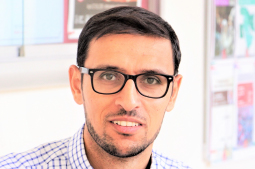
profile
Abdalrahman Migdad
Completed in Fall 2018
Affiliation: Graduate School of Global Studies
Name of employer: Istanbul Sabahattin Zaim University (IZU)
Q1.What are the reason(s) you decided to participate in the GRM program?
For a global learning opportunity from a Japanese perspective, after having explored the US.
Q2.What was your career goal/path you were thinking when you entered graduate school?
A mix between Academia and Business.
Q3.Did you make any efforts which led you to finding a job while you were in your graduate school?
Yes - I interned in places I was interested in, I also dedicated the last period of my Ph.D. duration to job applications and Post-doc opportunities.
Q4.What made you decide your current career/job?
It was a great opportunity in the field of my academic interest and a new place to experience.
Q5.How did your experience in the GRM program influence your career path?
It gave me an advantage - I'm not just a Ph.D. graduate but also a GRM graduate.
Q6.In what kind of situations did you find it positive and helpful to have learned from GRM program as you work for the current company?
One of the main benefits was in organizing international events and conferences.
Q7.Did you encounter any difficulties in your job hunting as a Ph.D. candidate? If so, please describe it.
Graduating the GRM from a Japanese university (Doshisha) was a supportive advantage and facilitated an easier-than-usual transition.
Q8.What do you think are the benefits of Ph.D. holders' working for a private company?
They come with a global perspective and multiple experiences from different countries.
Q9.What is your perspective on the expanding role of a Ph.D. holder in society in the days ahead?
The role of a Ph.D. holder reflects the educational experience. The experience offered by the GRM was practical and an enabling factor for participants to be socially influential figures.
Q10. Please write a message to students who are considering whether or not to take the GRM Program.
I highly encourage enrolment in the GRM program. As far as I have seen, all the graduates occupy important roles in the communities they are in. This is the goal students seek to achieve.

profile
Rehab Abu-Hajiar
Completed in Fall 2018
Affiliation: Graduate School of Global Studies (Global Studies)
Name of employer: Private University
Q1.What are the reason(s) you decided to participate in the GRM program?
I joined the GRM program in 2015 and I was very enthusiastic about it. One of the things that made me interested in this program is that the courses in which I am taking care of the issues and problems of the world as a whole without exception. Thus, the student comes out of this program with a huge amount of information and applications that benefit him in his career.
What prompted me to join the program is that the idea of the GRM program depends on the graduation of people who can find practical solutions to global problems in general and the problems of third world countries or marginalized areas in particular, In addition to the competence of each student in his/her field of research.
Q2.What was your career goal/path you were thinking when you entered graduate school?
My main goal was to broaden my knowledge towards global issues in all areas and try to play an active role in trying to find solutions to them.
Q3.Did you make any efforts which led to finding a job while you were in your graduate school?
During my study in the GRM program, in each semester I had a meeting with one of the professors who are following the program to discuss my future plan. And give useful advice on how to enter the academic field in Japanese universities.
Q4.What made you decide your current career/job?
After delving deeper into the field of research in medical ethics from an Islamic point of view, I found that there is a great lack of research done in this field. This prompted me to do new studies to follow the development of science and research and study it from an Islamic viewpoint.
Q5.How did your experience in the GRM program influence your career path?
My experience with the GRM program gave me an excellent opportunity to learn about global issues, moreover, the problems that deal with policy and policymaker. In addition to global issues like global economic, problems related to the environment, water and electricity. I became more aware of these problems, and I have the ability to think and work collectively within a team trying to find solutions.

Q6.In what kind of situations did you find it positive and helpful to have learned from GRM program as you work for the current company?
I can say that this program has strengthened my confidence in the ability to follow up on the issues and discuss it with the specialists. This confidence came through several meetings and sessions with professors and students in many research subjects and got used to the idea of dialogue and discussion.
Q7.Did you encounter any difficulties in your job hunting as a Ph.D. candidate?
If so, please describe it.
In my case because I am looking for an academic job as a fellowship researcher, I think the difficulty lies only in finding a host university or a vacant position in a universities.
Q8.What do you think are the benefits of Ph.D. holders' working for a private company?
I believe that Ph.D. holders have an important role in private companies by benefiting from their experience in both the academic and practical fields. Which will contribute to the development and improvement of their performance.
Q9.What is your perspective on the expanding role of a Ph.D. holder in society in the days ahead?
In my view, I believe that Ph.D. holders should have an active role that goes beyond their specialty. In a contribution to trying to find practical solutions to the problems that society suffers from, such as the aging of society, the integration of foreign workers and new immigrants into Japanese society, and other issues of concern to Japanese society.
Q10. Please write a message to students who are considering whether or not to take the GRM Program.
I recommend the students to join to GRM program to expand their knowledge and information toward the global issues. Since we are become living in a small village and we sharing the same global issues, each of us should take their responsibilities toward our planet to protect it for the coming generations.

profile
Nakagawa Masao
Completed in Fall 2018
Affiliation: Graduate School of Science & Engineering (Mechanical Engineering)
Name of employer: Research institute in Ministry of Land, Infrastructure, Transport and Tourism
Q1.What are the reason(s) you decided to participate in the GRM program?
In order to contribute to society with my knowledge of mechanical engineering science, I believe that knowledge of humanities and social sciences was necessary. This is why I decided to join GRM.
Q2.What was your career goal/path you were thinking when you entered graduate school?
I was not sure to pursue a Ph.D. at first, and become a researcher working in different counties. However, GRM provided me with insights and experience more than I imagined.
Q3.Did you make any efforts which led to finding a job while you were in your graduate school?
Through the support of GRM career camp, I was able to do training as internship at a company.
Q4.What made you decide your current career/job?
I conducted an internship by the support of GRM, and it opened new possibilities, so I decided to pursue my current position.
Q5.How did your experience in the GRM program influence your career path?
I had discussions with international students on multicultural coexistence, knowledge concerning humanities and social sciences. Therefore, this helps me tremendously in my current work setting international standards for self-driving.

Q6.In what kind of situations did you find it positive and helpful to have learned from GRM program as you work for the current company?
Experience in GRM is the basis of my current role in contributing to society through my core knowledge of mechanical engineering.
Q7.Did you encounter any difficulties in your job hunting as a Ph.D. candidate?
If so, please describe it.
I didn't face any difficulty finding a job because my current position was required a Ph.D. qualification.
Q8.What do you think are the benefits of Ph.D. holders' working for a private company?
I think that a Ph.D. opens up opportunity in playing active role internationally.
Q9.What is your perspective on the expanding role of a Ph.D. holder in society in the days ahead?
Having a Ph.D. does not mean that you can easily overcome challenges in the world. But it is the minimum necessity for the first step. In a society where global connections are important, I feel that the need for Ph.D. degrees will increase even more.
Q10. Please write a message to students who are considering whether or not to take the GRM Program.
Experience and knowledge cannot be underestimated. If you believe that your goal is high, you are ready for GRM. Only you can shape your life. Try to make the most of GRM. We look forward to the courageous challengers who follow us.

profile
Chen Yanshuang
Completed in Fall 2018
Affiliation: Graduate School of Commerce (Commerce)
Name of employer: Private University
Q1.What are the reason(s) you decided to participate in the GRM program?
The reason I was applying for GRM program was to explore the possibility to contribute to society.
Q2.What was your career goal/path you were thinking when you entered graduate school?
I have always imagined I would rather work for a company.
Q3.Did you make any efforts which led to finding a job while you were in your graduate school?
I was thinking about working for a Japanese company since my research is business management.
Q4.What made you decide your current career/job?
I realized that teaching each student with respect is very rewarding and the fun of pursuing learning. That is why I chose this profession.
Q5.How did your experience in the GRM program influence your career path?
I have received training in research survey method and “executive ability”, and the ability to think logically about things in a bird's-eye view, which I learnt throughout the GRM courses. That is being utilized in current research activities.

Q6.In what kind of situations did you find it positive and helpful to have learned from GRM program as you work for the current company?
GRM Program strengthened my ability to speak English, the ability to solve problems based on logical thinking and how one can build up a human network.
Q7.Did you encounter any difficulties in your job hunting as a Ph.D. candidate?
If so, please describe it.
I am not sure because I haven't experienced any job hunting for a company.
Q8.What do you think are the benefits of Ph.D. holders' working for a private company?
In case of solving every-day problems in a company, Ph.D. holders are expected to act independently, and to think intelligently and logically.
Q9.What is your perspective on the expanding role of a Ph.D. holder in society in the days ahead?
Japanese society will change perception concerning employing doctoral-degree holders. Society will realized Ph.D. holders can strongly contribute for society through technological innovation and international competitiveness by promoting advanced business management, and to solve social problems.
Q10. Please write a message to students who are considering whether or not to take the GRM Program.
We encourage you to join GRM program if you are interested in solving various social issues and think you would like to work hard for your life while you are young.

profile
Chen Yan
Completed in Fall 2018
Affiliation: Graduate School of Global Studies (Global Studies)
Name of employer: ZS Associates (Healthcare Consulting Firm)
Q1.What are the reason(s) you decided to participate in the GRM program?
The concept of “fusion of science and technology” is very attractive.
Another important factor is learning with multinational and multicultural students from a variety of backgrounds.
Q2.What was your career goal/path you were thinking when you entered graduate school?
When I entered graduate school, I envisioned a career path mainly for international NPOs / NGOs or research positions.
GRM has many partnerships with international NPOs / NGOs and has provided an opportunity to deepen my understanding of them.
Q3.Did you make any efforts which led to finding a job while you were in your graduate school?
In the second year of my doctoral program, I was an intern at a Japanese research institute.
In the third year, I participated in career forums and an orientation event for employment selection.
Q4.What made you decide your current career/job?
My current job is a consultant specializing in the pharmaceutical industry.
I am interested in medicine and consulting.
This is why I decided on the current company.
Q5.How did your experience in the GRM program influence your career path?
Through GRM courses, I deepened my understanding of industries I was interested in.
Afterward, I came to aspire to work for a private enterprise.
Also, I think that students in normal doctoral course tend to have less access to fields and activities other than their field of specialty.
This can be a disadvantage when trying to find a job in a company.
GRM program can facilitate that.
When participating in activities in the GRM program, you get involved in many interesting diverse.
Through suchexperience, more options arise towards, securing a job.

Q6.In what kind of situations did you find it positive and helpful to have learned from GRM program as you work for the current company?
It was really worth getting involved in GRM program when you seek knowledge about different industries and fields. Moreover, in GRM, you get to improve English skills.
Q7.Did you encounter any difficulties in your job hunting as a Ph.D. candidate?
If so, please describe it.
Perhaps, private sector may consider a doctoral degree in humanities as over qualified.
Q8.What do you think are the benefits of Ph.D. holders' working for a private company?
Ph.D. holders have the habit of drawing conclusions based on credible data and in-depth analysis.
That is an advantage when working in a company.
Q9.What is your perspective on the expanding role of a Ph.D. holder in society in the days ahead?
The first step for doctoral degree holders is to use their skills and talents to contribute to society, and to recognize the value of their outlook as corporate managers and employees.
Company recruiters become more willing to hire doctoral degrees.
Q10. Please write a message to students who are considering whether or not to take the GRM Program.
Go ahead and explore GRM. It could be the path you are looking for.

profile
Chayadit Pumaneratkul
Completed in Spring 2018
Affiliation:Graduate School of Science and Engineering
Mechanical Engineering Course
Name of employer : Daikin Industries (Thailand) Ltd.
(Major Manufacturer of Air Conditioning Equipment)
Q1.What are the reason(s) you decided to participate in the GRM program?
To be a good leader in the society, the sole knowledge on engineering may not be enough. GRM is designed to support us, the student with the all-around knowledge that important for the next generation leader.
Q2.What was your career goal/path you were thinking when you entered graduate school?
I have imaged myself to be an engineer on the energy field. I wanted to use my knowledge to manage and overcome the energy problem we are facing.
Q3.Did you make any efforts which led to finding a job while you were in your graduate school?
On the second year of my Ph.D. course, I received the support from the GRM program to conduct the internship aboard, the company I am working now.
Q4.What made you decide your current career/job?
A chance for Ph.D. holder to learn and grow in the field on research in private sector, also I want to use my knowledge and skill to improve on the air conditioning system.
Q5.How did your experience in the GRM program influence your career path?
During the GRM course, I got many chances to meet with people who work in various field, from the NGOs to private company. I have learned from them on what career path is possible for me in the future.
Q6.In what kind of situations did you find it positive and helpful to have learned from GRM program as you work for the current company?
GRM program taught me the interpersonal and communication skills. I have learned on the difference cultures through the friendship of GRM students.
Q7.Did you encounter any difficulties in your job hunting as a Ph.D. candidate?
If so, please describe it.
At my home country, Thailand, there are not much open positions for the Ph.D. holders, mostly are in the academic field. It was a bit tough to prove myself who has no working experience for a position in the private company.
Q8.What do you think are the benefits of Ph.D. holders' working for a private company?
As working in the private company, we use our knowledge to gain the benefit for the company. The Ph.D. holders have the deeper understanding on their own field that we can create or research something from the zero, and contribute the business of the company.
Q9.What is your perspective on the expanding role of a Ph.D. holder in society in the days ahead?
As a Ph.D. holder, we might not know everything, but we can start to learn and expand the knowledge to the society as well.
Q10. Please write a message to students who are considering whether or not to take the GRM Program.
For the one who is considering joining the GRM program, if you are looking for the utter experience to grow and gain in the knowledge and personal development, GRM is a path to bring you to your aim. Try to challenge yourself and be a good leader for the society.
2017Graduates

profile
Doi Kenta
Completed in Fall 2017
Affiliation:Graduate School of Science and Engineering
Electrical and Electronic Engineering Course
Name of employer : ULVAC, Inc.
(Major Manufacturer of Industrial Vacuum Equipment)
Q1.What are the reason(s) you decided to participate in the GRM program?
I had a longing for studying abroad, and developing international knowledge and understanding. I decided to take part in the GRM program because I thought I could gain practical and multicultural experience and skills on a world scale through the program.
Q2.What was your career goal/path you were thinking when you entered graduate school?
When I entered a graduate school, I hoped to work for a research institute.
Q3.Did you make any efforts which led to finding a job while you were in your graduate school?
I visited companies and research institutes where Ph.D. holders play an active role. When I had opportunities to meet researchers who work for companies at conferences, I asked them about their job tasks and work ways.
Q4.What made you decide your current career/job?
By visiting companies and communicating with researchers in companies, I realized that there is a wide range of opportunities for Ph.D. holders to take an active role in private sectors, too.
Q5.How did your experience in the GRM program influence your career path?
In the GRM program, I had a lot of opportunities to communicate with people from companies and NPOs in various fields, which helped me to think about my future career path. I was able to take broader views of my career options, not only limited to work for a research institute.

Q6.In what kind of situations did you find it positive and helpful to have learned from GRM program as you work for the current company?
There are a lot of group discussions and opportunities of international exchange in my company, where I can utilize my experiences in GRM program. These days, companies are expected to have an understanding of SDGs (Sustainable Development Goals). I learned the basics of SDGs in the GRM program, so it is relatively easy for me to understand them. I'm grateful that I learned these issues because I think it was impossible for me to learn them through only my main research activities.
Q7.Did you encounter any difficulties in your job hunting as a Ph.D. candidate?
If so, please describe it.
I did not encounter a difficulty in getting a job. In addition to my experience and training in research fields, the experience gained through GRM program, including studying abroad experience, was highly valued as an asset.
Q8.What do you think are the benefits of Ph.D. holders' working for a private company?
In the doctoral course, problem solving skills are developed because it is often required to solve difficult issues on your own. There are many situations where problem-solving ability is required while working in a company. So there are many occasions for Ph.D. holders to play an active role.
Q9.What is your perspective on the expanding role of a Ph.D. holder in society in the days ahead?
Having experience and knowledge in a specialized field is of course important, but I believe that Ph.D. holders, who have interest in a wide variety of fields and discussion skills, are highly sought after by various institutions.
Q10. Please write a message to students who are considering whether or not to take the GRM Program.
I strongly recommend you to take the GRM program. You can build an international network of experts through group discussions, as well as learn issues relevant to the private sector and the society in general. I think collaborative projects among GRM program alumni could emerge among various companies beyond borders.

profile
Dipak Gaire Sharma
Completed in Fall 2017
Affiliation:Graduate School of Science and Engineering
Information and Computer Science
Name of employer : Autonomous Control Systems Laboratory Ltd.
(Drone Manufacturer)
Q1.What are the reason(s) you decided to participate in the GRM program?
The biggest draw for the GRM program when I was applying was the diversity of opportunities that it offered. I did my undergrad study in information management and really enjoyed it, but that wasn’t my only interest. The GRM program promised to expose me to the fields of science, engineering, and global studies, in both a theoretical and practice sense. As someone with a wide range of interests who was keen to have new experiences, it was a natural move to take part in the GRM program.
Q2.What was your career goal/path you were thinking when you entered graduate school?
To be honest, I was not sure about the concrete path or career goal when I first entered graduate school for my master’s degree. I was open to trying new things and wanted to take advantage of the wide range of opportunities that were available on the GRM program. I wasn’t at a point where I was ready to commit to one specific field, so I saw this as a chance to spend time on some of my many interests.
Q3.Did you make any efforts which led to finding a job while you were in your graduate school?
I was particularly fortunate in that my experience on the program led to a direct job in one of the companies I was involved with. As a result, I had no particular need to put a lot of effort into various job-hunting activities. I did, however, have the opportunity to attend a couple of job fair sessions. I know there were also further support mechanisms available if I needed them.
Q4.What made you decide your current career/job?
I’ve had an interest in artificial intelligence since I was studying for my undergrad and was already thinking about a career in the field when I joined Doshisha. I had some other modules as part of my computer science Ph.D. that were directly related to machine learning. However, the experience of working as an intern for 3 months in the field had a big influence in my decision to pursue a career in AI. It gave me experience of working in AI for business, not just academia, which I am still finding valuable today.
Q5.How did your experience in the GRM program influence your career path?
Working as an intern as part of the GRM program was a completely different experience to working in academia. It gave me professional experience in the field I was interested in, which would have been hard to find on my own. It opened my eyes to further career options outside of academia that I hadn’t thought much about before. Having the experience of working in business was extremely valuable when the time came to decide what my next steps would be after university.
Q6.In what kind of situations did you find it positive and helpful to have learned from GRM program as you work for the current company?
I was lucky enough to get a job in the company where I was an intern in the GRM program. My experience during that internship is directly related to the work I do now. Having that experience has allowed me to come into my job and make an immediate impact.
I also did a lot of seminars, field work, and onsite practices in different parts of the world as a part of GRM program, which made me more confident when entering my new company as a full-time employee.
Q7.Did you encounter any difficulties in your job hunting as a Ph.D. candidate?
If so, please describe it.
The biggest barrier for me was the Japanese language. It can be difficult to find the right kind of opportunities as someone who is not completely fluent in the native language of this country.
However, I had different advantages that I could bring to the table when applying for work. From the various onsite practices, international fieldwork sessions, and joint seminars that I had taken part in, I had a depth of knowledge and experience to draw, on that set me apart from other candidates.
Q8.What do you think are the benefits of Ph.D. holders' working for a private company?
When you’re a Ph.D. student, you spend several years studying to become a specialist in a particular field. On the other hand, the business environment tends to mold people into generalists, who are good at a wide range of things but not excellent in one. This means that as a Ph.D. student, you can go into a company and immediately have something to offer to colleagues that may have been working in the field for several years. This creates a great environment where everyone is able to learn from each other.
Q9.What is your perspective on the expanding role of a Ph.D. holder in society in the days ahead?
One of the most valuable things about studying for a Ph.D. is that you learn how to learn. This applies not only to your field of study but also to anything else that you turn your hand to, whether that’s in the humanities, social sciences, or engineering. Ph.D.s create people who are able to understand problems and provide thoughtful, innovative solutions. My experience on the GRM program and the onsite practice it offered in various different countries on a wide variety of issues is evidence of this.
Q10. Please write a message to students who are considering whether or not to take the GRM Program.
In my experience, the GRM program provided me with a wide range of opportunities both inside and outside Japan, as well as an international network of experts and mentors who I was able to gain valuable insight from. Both of these prove invaluable later on in your career. Of course, these things can be found elsewhere, but it’s extremely rare to find them both in the same place. It’s an opportunity worth serious consideration. I’m extremely glad that I choose to take part in it.

profile
Liu Xiao
Completed in Fall 2017
Affiliation:Graduate School of Commerce
Commerce Course
Name of employer : Major Property Development
Company
Q1.What are the reason(s) you decided to participate in the GRM program?
I was touched by GRM program providing knowledge integrating Social and Engineering Studies, fostering leaders who can tackle issues in developing countries.
Q2.What was your career goal/path you were thinking when you entered graduate school?
My career goal is to work in a global company for developing countries and to make a contribution to Japan through research or business.
Q3.Did you make any efforts which led to finding a job while you were in your graduate school?
I attended MEXT leading graduate school program’s national event and communicated with HRs from a lot of companies.
Q4.What made you decide your current career/job?
My current company is the biggest real estate in the world which contributes to the developing countries and poverty reduction.
Q5.How did your experience in the GRM program influence your career path?
Through GRM, I am glad to join the global company which is doing corporate social responsibility very well.

Q6.In what kind of situations did you find it positive and helpful to have learned from GRM program as you work for the current company?
I need to cooperate with many stakeholders during my work, the teamwork skill I have learned from GRM helped me a lot.
Q7.Did you encounter any difficulties in your job hunting as a Ph.D. candidate?
If so, please describe it.
I didn’t encounter any difficulties in my job hunting because some companies are recruiting Ph.D. candidate positively.
Q8.What do you think are the benefits of Ph.D. holders' working for a private company?
Logical thinking, time management and communication skills.
Q9.What is your perspective on the expanding role of a Ph.D. holder in society in the days ahead?
I hope Ph.D. holders can bring into play their advanced expertise, sophisticated languages and business management skill, not only the universities, companies, research institutes, but also can build up a new organization and make a contribution to the multi-cultural society.

Q10. Please write a message to students who are considering whether or not to take the GRM Program.
Just do it!

profile
Takagi Akuto
Completed in Fall 2017
Affiliation:Graduate School of Science and Engineering
Applied Chemistry Course
Name of employer : Planterior Co., Ltd.
(Landscape and Gardening Company)
Q1.What are the reason(s) you decided to participate in the GRM program?
The reason is that it is the program in the interdisciplinary field of resource management. I have been interested in the human resource management.
Q2.What was your career goal/path you were thinking when you entered graduate school?
I wanted to be a business owner or researcher.
Q3.Did you make any efforts which led to finding a job while you were in your graduate school?
Nothing in particular. I concentrated on my study and often spent time with my friends.
Q4.What made you decide your current career/job?
I became interested while studying company management.
Q5.How did your experience in the GRM program influence your career path?
I could learn the understanding of relevant matters to employment in a company.

Q6.In what kind of situations did you find it positive and helpful to have learned from GRM program as you work for the current company?
Because I had a great deal of experience in the GRM program, I became more confident. For example, I did a lot of discussions with doctoral students from other universities. When I presented my opinions about some issues, not only agreed, but often they were opposed. I felt very confident when I could think about how I could make counterarguments and my opinions were accepted. Also, when my arguments were not accepted, I reviewed them carefully.
This experience has helped me a lot in conveying my opinions to employees at meeting in our company now. I think I became more persuasive than before.
Basic knowledge on resource management can be gained by reading books. However, by participating in the GRM program, you will be able to think how basic knowledge can be applied and present your opinions to other people with confidence.
Q7.Did you encounter any difficulties in your job hunting as a Ph.D. candidate?
If so, please describe it.
No problem.
Q8.What do you think are the benefits of Ph.D. holders' working for a private company?
We can utilize natural, cultural and human resources in companies. It depends on the amount of resources the company possesses in addition to the shared size of resource amount. By belonging to a company, we have more options for taking actions as companies, in many cases, possess relatively large options.
Q9.What is your perspective on the expanding role of a Ph.D. holder in society in the days ahead?
Ph.D. graduates generally enjoy high level of literacy competency. However, competency required for working in a company is not necessarily high. I think that this is the reason why Ph.D.s are considered difficult to handle as an employee from the perspective of a company.
In foreseeing the future and potential competency, Ph.D. graduates can improve and expand their opportunities. I do believe the professional work of Ph.D. graduates can be performed efficiently as a result of their high literacy.
To achieve this, doctoral students should have more opportunities to socialize. I believe GRM program provides enough support in this respect.
Q10. Please write a message to students who are considering whether or not to take the GRM Program.
If you find a company or an organization you are interested in, you can do informal internships. Also, instructors of GRM program will help you from the very stage of making an appointment with a company.
Those who have a clear vision of their future career can make own goal more realistic by taking advantage of what GRM courses offer. Also, I think that GRM courses are effective and helpful for those who do not have a clear vision to plan their future career.

profile
Glynnis Mae Quiñones Saquilayan
Completed in Spring 2017
Affiliation:Graduate School of Science and Engineering
Electrical and Electronic Engineering
Name of employer : National Institutes for Quantum and Radiological Science and Technology
Q1.What are the reason(s) you decided to participate in the GRM program?
It is rare to have the opportunity to learn other things that may or may not be relevant to your field of expertise. If you are able to develop those other skills, which is what GRM offers, it will most likely make you stand out more as a skilled professional in the future.
Q2.What was your career goal/path you were thinking when you entered graduate school?
I have always planned on being scientist.
Q3.Did you make any efforts which led to finding a job while you were in your graduate school?
I was able to visit many research institutions both in Japan and overseas, and also even an internship in a US National Laboratory. It helped me grow a lot as a researcher.
Q4.What made you decide your current career/job?
I have always aimed for it from the beginning. However, GRM has provided me with many opportunities that was very useful for my objective.
Q5.How did your experience in the GRM program influence your career path?
With the freedom GRM allows their students to choose their multidisciplinary courses, you can tailor a set of classes that is beneficial to you and also compliment your skills.

Q6.In what kind of situations did you find it positive and helpful to have learned from GRM program as you work for the current company?
As I am now working in a multinational research collaboration, other skills aside from your own research capabilities are very useful. Introductory courses in institution and project management has been helpful in understanding bureaucratic procedures when dealing with the different policies of each country.
Q7.Did you encounter any difficulties in your job hunting as a Ph.D. candidate?
If so, please describe it.
As a young researcher, the competition is very tough when you are still starting your career. You will need to get as much skills (social skills included!), relevant experience and determination if you want people to look at you.
Q8.What is your perspective on the expanding role of a Ph.D. holders' in society in the days ahead?
Society expects a lot from Ph.D. holders because people know they studied a lot for it. This makes exaggerated expectations that they should be able to cope with almost anything from research to management. So depending on the career path, it really is useful to have a broad perspective to come up with fresh new ideas and also other practical skills to excel in supporting tasks.
Q9.Please write a message to students who are considering whether or not to take the GRM Program.
The GRM Program will give you a lot of rare opportunities and you can use it to your advantage depending on what career path you wish to take.
2015Graduates

profile
ZHANG TIAN
Completed in Spring 2015
Affiliation:Graduate School of Science and Engineering
Science of Environment and Mathematical Modeling
Name of employer : Outotec (Finland) Oy (Electrical equipment manufacturers)
Q1.What are the reason(s) you decided to participate in the GRM program?
I was attracted by the idea of multicultural co-existence, integrating Science and Engineering and Global Studies.
I am confident that these will become extremely important for the future of our societies.
Q2.What was your career goal/path you were thinking when you entered graduate school?
I hoped to work for a company that could put my research into practical use.
Q3.Did you make any efforts which led to finding a job while you were in your graduate school?
I have been engaged in research and development since I was in graduate school.
Q4.What made you decide your current career/job?
I decided my current career because I could continue my research at university, and could use my utmost confidence in research.
Good salary, work style (Work-Life Balance). I think it would be difficult to find such good treatment and work environment at a Japanese company.
Q5.How did your experience in the GRM program influence your career path?
I felt it was fun to work with people from different national backgrounds.

Q6.In what kind of situations did you find it positive and helpful to have learned from GRM program as you work for the current company?
The concept of multiculturalism has become a very important basis for working in a global company.
Q7.Did you encounter any difficulties in your job hunting as a Ph.D. candidate?
If so, please describe it.
I did not feel any difficulties in getting my current job. However, it seems that Japanese companies tend to shun away job applicants who are Ph.D. holders.
Q8.What do you think are the benefits of Ph.D. holders' working for a private company?
A Ph.D. holder can be the best in his/her own specialty, and they do have the potential to become exceptional leaders in the world.
Q9.What is your perspective on the expanding role of a Ph.D. holder in society in the days ahead?
I think that a big breakthrough and a new business will be born by integrating Science and Engineering and Global Studies.

Q10. Please write a message to students who are considering whether or not to take the GRM Program.
You should invest in yourself more.
Tackle every challenge without being afraid of failure.
Learn a lot from failure.



